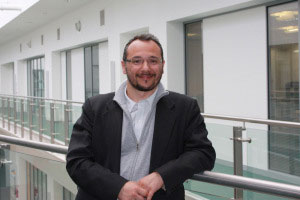| May 08, 2013 |
New appointment brings graphene closer to nanomedicine
|
|
(Nanowerk News) The University of Manchester has today announced the appointment of a world-leading academic, who is playing a pivotal role in nanomedicine - a growing field with potential to benefit patients suffering from neurodegenerative disease and cancer.
|
|
Professor Kostas Kostarelos also brings to Manchester his Nanomedicine Laboratory which generates tiny materials to assist clinicians and is ranked among the top in the world.
|
 |
| Kostas Kostarelos
|
|
His appointment, along with his 15-strong team of scientists, will help bring graphene closer to medicine with collaborations across the University and with its partner hospitals.
|
|
It follows a three-year collaboration with the University’s Nobel Laureates Professor Andre Geim and Professor Kostya Novoselov, who first isolated graphene, the world’s thinnest, strongest and most conductive material, in 2004. This led to the discovery of a whole new family of one-atom-thick materials.
|
|
Professor Kostarelos’s expertise includes developing minuscule needles to inject drugs into brain and other cells which in the future could help the treatment of neurodegenerative diseases and cancer. He sees great potential to use graphene in medicine.
|
|
He said: “Our Nanomedicine Lab has been collaborating with Manchester since 2010 in order to develop and use graphene material safely and effectively in medicine. Along with the activities around the creation of the National Graphene Institute in Manchester and the EU-funded Graphene
Flagship research programme, we will surely expand and reinforce this collaboration. Our broader aim is to bring graphene closer to medicine across The University of Manchester campus and its great hospitals.”
|
|
Professor Novoselov said: “There is great potential for using graphene for medical applications and procedures and I am greatly looking forward to working with Professor Kostarelos on this fascinating and important area. He brings a wealth of world-class experience in the field of nanomedicine.”
|
|
The move north was also prompted by the opportunity to work more closely with academics and clinicians in The University of Manchester, the Manchester Academic Health Sciences Network (MAHSC) and the Manchester Cancer Research Centre (MCRC).
|
|
MAHSC, a partnership between the University and six NHS organisations, brings clinicians and academics together to work on rapid dissemination and translation of health research and education in to practice to benefit patients. MCRC is a partnership between The University, The Christie Hospital and Cancer Research UK.
|
|
Professor Kostarelos, who joins the University in June, added: “At Manchester clinicians and biomedical scientists are very conscious about their conviction and drive to bridge the gap between nanotechnology and medicine. This is not common around the world and strongly influenced my decision to move, along of course with the opportunity to collaborate with great scientists in Manchester from a wide range of disciplines.’’
|
|
“I’m hoping our relocation will reinforce our existing efforts in using nanotechnologies to deliver genetic information to specific regions of the brain for patients suffering from neurodegenerative disorders.
|
|
“It should also help in my second major research area in cancer. Manchester has an excellent reputation in cancer research and my team wants to build strong links here. We believe we can be a very strong asset trying to get nano-technology treatments for cancer and developing applications to work on tumours.”
|
|
Professor Kostarelos trained as a chemical engineer and graduated from Imperial College London. He has held posts at the University of California in San Francisco, Memorial Sloan-Kettering Cancer Centre and Weill Medical College of Cornell University both in New York, Imperial College and University College London. His research has raised more than £7million of direct grant funding for his Nanomedicine Lab during the last few years. The Nanomedicine Lab he founded is investigating novel gene therapies, clinical use of stem cells, advanced delivery systems for radio- and chemo-therapeutic agents against cancer and engineering smart vector systems for imaging and therapeutics.
|
|
Professor Dame Nancy Rothwell, the President and Vice-Chancellor of The University of Manchester, said: “I am delighted that Professor Kostarelos will be joining us. He brings unique expertise which spans from nanomaterials to biomedicine.”
|
|
Professor Ian Jacobs, Dean of the University’s Faculty of Medical and Human Science and MAHSC Director, added: “Professor Kostarelos is an outstanding academic who will add to our efforts to translate cutting-edge science into novel approaches to health care. He will work with other outstanding scientists and clinicians in Manchester to make a difference to the care of patients locally and on an international scale.”
|

